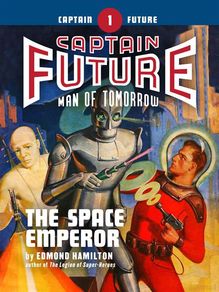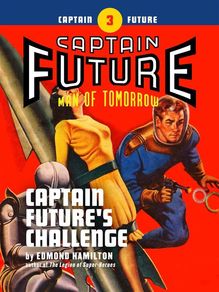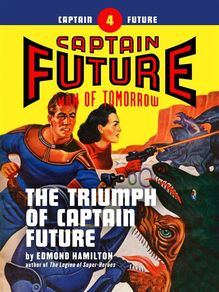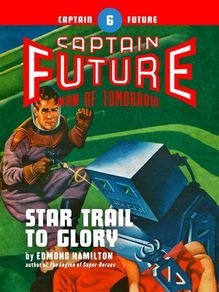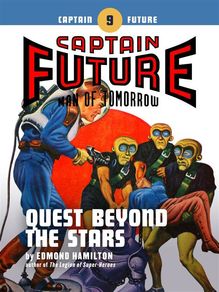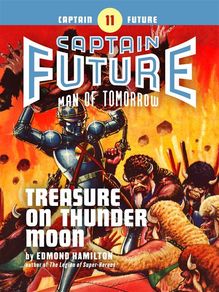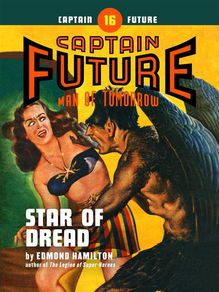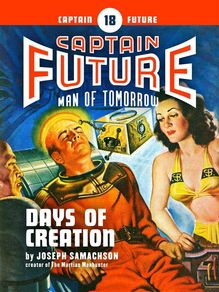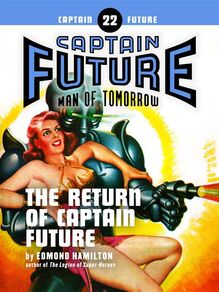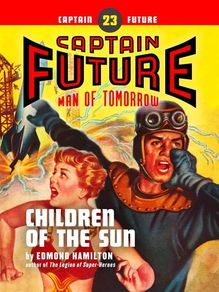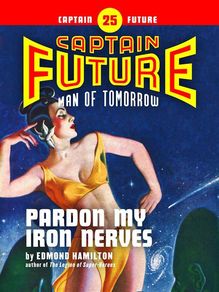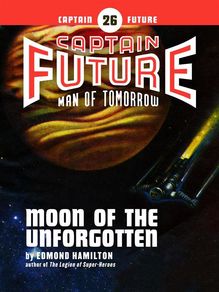-
 Univers
Univers
-
 Ebooks
Ebooks
-
 Livres audio
Livres audio
-
 Presse
Presse
-
 Podcasts
Podcasts
-
 BD
BD
-
 Documents
Documents
-
- Cours
- Révisions
- Ressources pédagogiques
- Sciences de l’éducation
- Manuels scolaires
- Langues
- Travaux de classe
- Annales de BEP
- Etudes supérieures
- Maternelle et primaire
- Fiches de lecture
- Orientation scolaire
- Méthodologie
- Corrigés de devoir
- Annales d’examens et concours
- Annales du bac
- Annales du brevet
- Rapports de stage
La lecture à portée de main
Vous pourrez modifier la taille du texte de cet ouvrage
Découvre YouScribe en t'inscrivant gratuitement
Je m'inscrisDécouvre YouScribe en t'inscrivant gratuitement
Je m'inscrisEn savoir plus
Vous pourrez modifier la taille du texte de cet ouvrage
En savoir plus

Description
The Captain Future saga follows the super-science pulp hero Curt Newton, along with his companions, The Futuremen: Grag the giant robot, Otho the android, and Simon Wright the living brain in a box. Together, they travel the solar system in series of classic pulp adventures, many of which written by the author of The Legion of Super-Heroes, Edmond Hamilton.
Sujets
Informations
| Publié par | Thrilling |
| Date de parution | 29 novembre 2018 |
| Nombre de lectures | 0 |
| EAN13 | 9788829562619 |
| Langue | English |
Informations légales : prix de location à la page 0,0005€. Cette information est donnée uniquement à titre indicatif conformément à la législation en vigueur.
Extrait
Birthplace of Creation
Captain Future book #28
by
Edmond Hamilton
In their final adventure, the Futuremen are called on to save the Universe itself from a madman’s destructive whim!
Thrilling
Copyright Information
“Birthplace of Creation” was originally published in 1951. No part of this book may be reproduced or utilized in any form or by any means, electronic or mechanical, without permission in writing from the publisher.
Chapter I
Citadel of the Futuremen
GARRAND watched the face of the Moon grow larger in the forward port of his small cruiser. A white and terrible face, he thought. A death’s-head with meteor-gnawed bones and gaping crater-wounds, bleak and cruel and very silent, watching him come and thinking secret boding thoughts about him. A feeling of sickness grew in him.
“I am a fool and soon I will probably be a dead fool,” he said to himself.
He was not a brave man. He was very fond of living and he did not think of death at all as a thing to be dared and laughed at. The knowledge that he was likely to die there on the Moon gave him qualms of physical anguish that made him look as white and hollow as the stony face that watched him through the port. And yet he did not turn back. There was something in Garrand that was stronger than his fear. His hands trembled, but they held the cruiser grimly on its course.
The stark plains and mountain ranges took size and shape, the lonely mountains of the Moon that looked on nothing and the plains where nothing stirred, not even the smallest wind or whirl of dust. Men had gone out to other worlds and other stars. They had ranged far across space, founding colonies on asteroids and cities on the shores of alien seas. But they left the deathly airless Moon alone. They had looked at it once and gone away. There were only four who made the Moon their home—and not all of those four where men.
Tycho Crater widened out below the little ship. Licking dry lips metallic with the taste of fear, Garrand consulted a map, drawn carefully to scale and showing in that desolation one intricate diagram of a man-made structure. There were ominous gaps in that diagram and Garrand was painfully aware of them. He made his calculations and set his ship down well beyond the outer periphery of defenses marked on the chart.
His landing was a clumsy nervous one. White pumice-dust burst upward around the hull and settled slowly back again. Garrand cut his jets and sat for a moment looking out across Tycho, all ringed around in the distance with cliffs and spires and pinnacles of blasted rock that glittered in the light. There was no sign of the structure indicated on the chart. It was all below ground. Even its observatory dome was set flush, reflecting the Sun’s unsoftened glare no more than the surrounding plain.
PRESENTLY Garrand rose, moving with the stiff reluctance of a man going to the gallows. He checked over the bulky shapes of a considerable mass of equipment. His examination was minute and he made one or two readjustments. Then he struggled into a pressure-suit and opened the airlock. The air went out with a whistling rush and after that there was no sound, only the utter silence of a world that has heard nothing since it was made.
Working in that vacuum Garrand carried out a light hand-sledge and set it in the dust. Then he brought out the bulky pieces of equipment and loaded them onto it. He was able to do this alone because of the weak gravitation and when he was through, he was able for the same reason to tow the sledge behind him.
He set off across the crater. The glare was intense. Sweat gathered on him and ran in slow trickles down his face. He suffered in the heavy armor, setting one weighted boot before the other, with the little puffs of dust rising and falling back at every step, hauling the sledge behind him. And fear grew steadily in him as he went on.
He knew—all the System knew—that the four who lived here were not here now, that they were far away on a distant troubled world. But their formidable name and presence seemed to haunt this lifeless sphere and he was walking now into the teeth of the deadly defenses they had left behind them.
“They can be beaten,” he told himself, sweating. “I’ve got to beat them.”
He studied his map again. He knew exactly how far he had come from the ship. Leaving himself a wide margin of safety he activated the detector-mechanism on the sledge. The helmet of his pressure-suit was fitted with ultra-sensitive hearing devices that had nothing to do with sonic waves but translated sub-electronic impulses from the detector into audible sound-signals.
He stood still, listening intently. But the detector said nothing and he went on, very slowly now and cautiously, across the dead waste until his footsteps in the dust approached the line of that outer circle on the map. Then the detector spoke with a faint small clicking.
Garrand stopped. He bent over the panel of the mechanism, a jumble of dials, sorters, frequency-indicators and pattern-indicators. Above them a red pip burned in a ground-glass field. His heart hammered hard and he reached hastily for a black oblong bulk beside the detector.
He thought, “I’m still far enough away so that the blast won’t be lethal if this doesn’t work.”
The thought was comforting but unconvincing. He forced his hand to steady, to pick up the four-pronged plugs and insert them, one by one in the proper order, into the side of the detector. Then he dropped behind the sledge and waited.
The black oblong hummed. He could feel it humming where his shoulder touched the metal of the sledge. It was designed to pick up its readings from the detector, to formulate them, adjust itself automatically to the indicated pattern and frequency, to broadcast an electronic barrier that would blank out the impulse-receptivity of the hidden trap’s sensor-unit. That was its purpose. It should work. But if it did not….
He waited, the muscles of his belly knotted tight. There was no flash or tremor of a blast. After he had counted slowly to a hundred he got up again and looked. The red pip had faded from the ground-glass screen. There was a white one in place of it.
Garrand watched that white pip as though it were the face of his patron saint, hauling the sledge on slowly through that outer circle and through the ones beyond it that were only guessed at. Three times more the urgent clicking sounded in his ears and the dials and pointers changed—and three times the pip faded from red to white and Garrand was still alive when he reached the metal valve door set into the floor of the crater.
The controls of that door were plainly in sight but he did not touch them. Instead he hauled a portable scanner off the sledge and used it to examine the intimate molecular structure of the metal and all its control connections. By this means he found the particular bolt-head that was a switch and turned it, immobilizing a certain device set to catch an unknowing intruder as soon as he opened the valve.
Within minutes after that Garrand had the door open and was standing at the head of a steep flight of steps, going down. His heart was still thudding away and he felt weak in the knees—but he was filled with exultation and a great pride. Few other men, he thought, perhaps none, could have penetrated safely to the very threshold of this most impregnable of all places in the Solar System.
He did not relax his caution. A large mass of equipment went with him down the dark stairway, including the scanner. The valve closed automatically behind him and below in a small chamber he waited until pressure had build up and another door automatically opened. He found nothing more of menace except a system of alarm bells, which he put out of commission—not because there was anyone to hear them but because he knew there would be recorders and he wanted no signs, audible or visible, of his visit.
THE recorders themselves were relatively easy to detect. With an instrument brought for the purpose he blanked off their relay systems and went on across the great circular central chamber with the glassite dome through which the sunlight poured.
-
 Univers
Univers
-
 Ebooks
Ebooks
-
 Livres audio
Livres audio
-
 Presse
Presse
-
 Podcasts
Podcasts
-
 BD
BD
-
 Documents
Documents
-
Jeunesse
-
Littérature
-
Ressources professionnelles
-
Santé et bien-être
-
Savoirs
-
Education
-
Loisirs et hobbies
-
Art, musique et cinéma
-
Actualité et débat de société
-
Jeunesse
-
Littérature
-
Ressources professionnelles
-
Santé et bien-être
-
Savoirs
-
Education
-
Loisirs et hobbies
-
Art, musique et cinéma
-
Actualité et débat de société
-
Actualités
-
Lifestyle
-
Presse jeunesse
-
Presse professionnelle
-
Pratique
-
Presse sportive
-
Presse internationale
-
Culture & Médias
-
Action et Aventures
-
Science-fiction et Fantasy
-
Société
-
Jeunesse
-
Littérature
-
Ressources professionnelles
-
Santé et bien-être
-
Savoirs
-
Education
-
Loisirs et hobbies
-
Art, musique et cinéma
-
Actualité et débat de société
- Cours
- Révisions
- Ressources pédagogiques
- Sciences de l’éducation
- Manuels scolaires
- Langues
- Travaux de classe
- Annales de BEP
- Etudes supérieures
- Maternelle et primaire
- Fiches de lecture
- Orientation scolaire
- Méthodologie
- Corrigés de devoir
- Annales d’examens et concours
- Annales du bac
- Annales du brevet
- Rapports de stage
